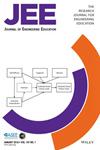Reasons and root causes: Conventional characterizations of doctoral engineering attrition obscure underlying structural issues
Abstract
Background
Although most engineering graduate students are funded and usually complete their degrees faster than other disciplines, attrition remains a problem in engineering. Existing research has explored the psychological and sociological factors contributing to attrition but not the structural factors impacting attrition.
Purpose/Hypothesis
Using systems theory, this study seeks to understand nuance in how underlying structural causes affect engineering graduate students' attrition experiences in ways that may differ from their official reasons for departure.
Design/Methods
Data were collected through semi-structured interviews with seven departing or already departed engineering doctoral students from R1 graduate programs across the United States. Using thematic analysis, root cause analyses were conducted to understand participants' attrition experiences to explore how structures influence causes of departure.
Results
The ways participants discuss root causes of their departure indicate differences in formal reasons for departure and underlying causes of departure. We highlight the role of informal and formal policy as root causes of a different attrition rationale often passed off as interpersonal issues. When interpreted as evidence of structural issues, the causes of departure show ways in which action–inaction, policy–“null” policy serve as structural features governing student attrition decision processes. We also highlight a form of benign neglect toward struggling graduate students.
Conclusion
This study reveals important nuances underlying face-value reasons of attrition indicating foundational structural issues contributing to engineering graduate student attrition. Coaching faculty in team management and encouraging close revision of departmental policies could help mitigate students' negative graduate experiences and decrease unnecessary attrition.

 求助内容:
求助内容: 应助结果提醒方式:
应助结果提醒方式:


